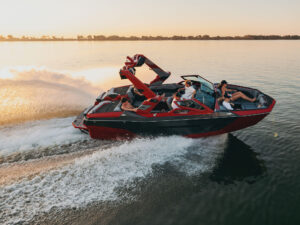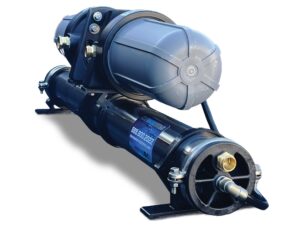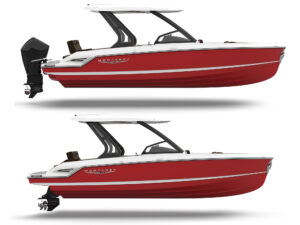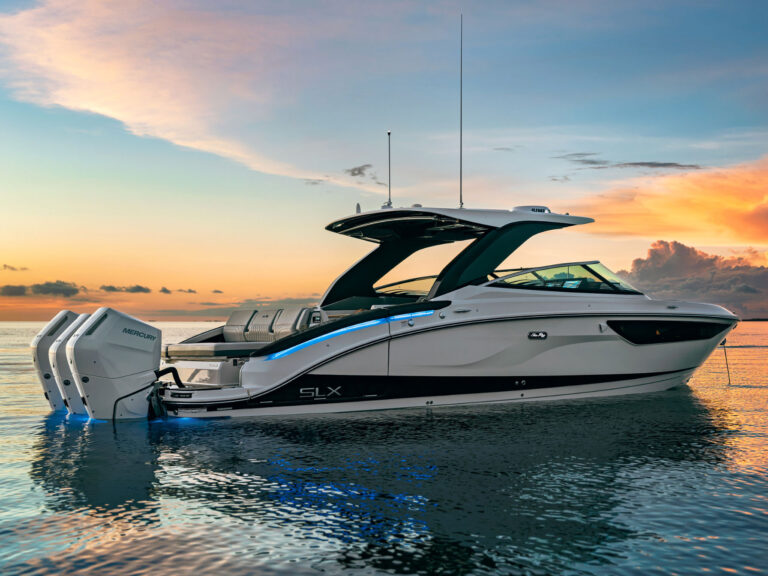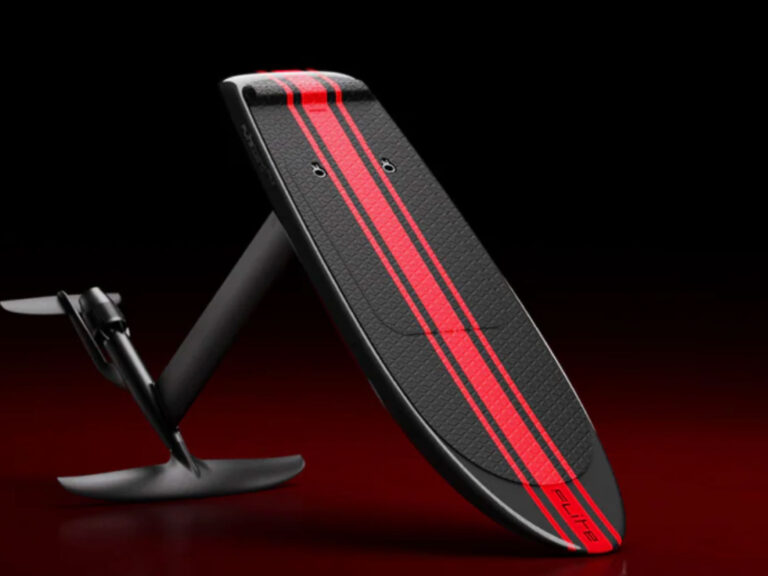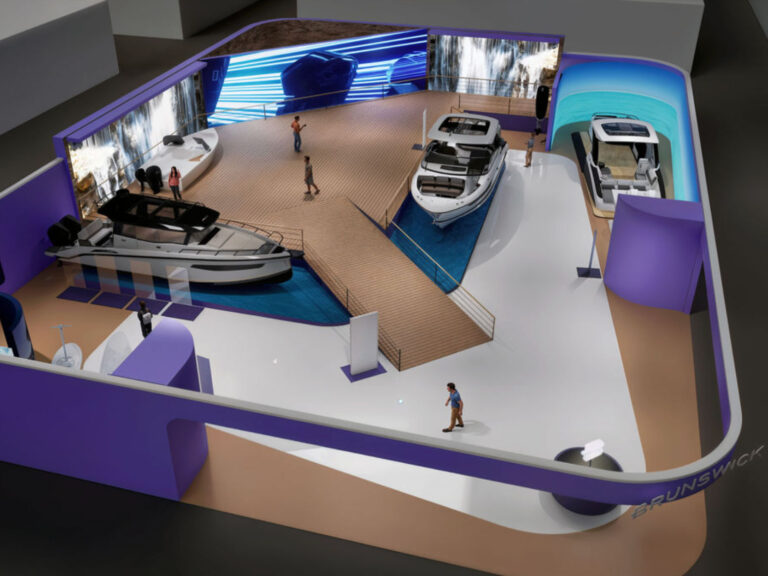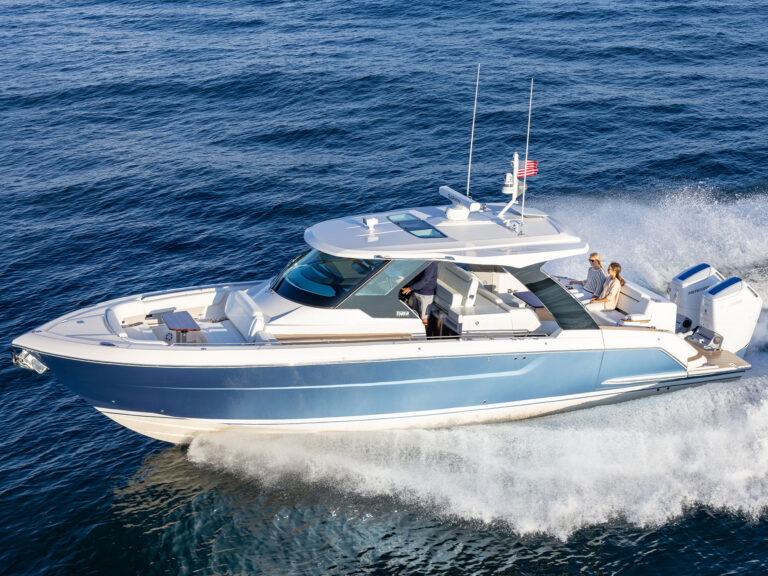Overview
The 100 mph Jaguar STS and its 500R Mercury Racing motor isn’t for everyone. In fact, Bass Cat president Rick Pierce personally qualifies each potential Jaguar STS buyer. How? Among other things, he’s looking for a buyer likely to have supercars such as Ferraris, McLarens or Porsches. STS stands for Soft-Touch Special hull. It has a wide footprint and a strategically designed and applied center pad and lifting strakes. The STS hull is not new, but with the arrival of Mercury’s 500R, Pierce had to dial it in for high power. We tested on a blustery day, with windblown lake chop topping 2 feet. This limited our results to 98.5 mph, but Pierce showed me saved GPS recordings of 103-plus mph.

Interior and Accessories
As a fishing platform, the Jaguar STS has a new console sculpted to carry a flush-mounted 12-inch multifunction display networked to show full engine data, as well as GPS position and charts. Tilt hydraulic steering keeps the Mercury 500R in line. A two-tier center console between the seats provides a step to the aft deck while housing a glove box and a cooler. Sturdy, stylish billet grab bars are within easy reach for pilot and navigator.


The large bow panel flush-mounts two stacked MFDs without external brackets, or easily accepts three with a Ballzout bracket. A main power switch, quick trolling-motor disconnect, and digital voltmeter are housed in a separate panel in the nose. All lids are supported with new soft-closure seals and “Slam” latches. The trolling-motor pedal position can be customized by fore or aft placement of a removable block. Built-in rod ramps in port and starboard gunwales secure rods on deck, and a large center locker for tackle boxes is flanked by a rod-storage box to port and a general storage locker to starboard. A center step up to the foredeck offers a second cooler.

Unique triangular livewells on the aft deck are engineered to prevent sloshing and to maintain balance at the centerline. Small triangular day-storage boxes are located behind the livewells, with larger dry-storage compartments on each side. Trays lift out to add access to pumps, screens and rigging already accessible beneath large removable hatches at the transom.
Read Next: Bass Cat Caracal STS

How We Tested
- Engine: Mercury 500R FourStroke 500 hp
- Drive/Prop: Outboard/Mercury Bravo I FS 15.25″ x 32″ 4-blade stainless steel
- Gear Ratio: 1.60:1 Fuel Load: 35 gal. Crew Weight: 450 lb.
High Points
- Sleek console redesign for 2024 adds a more aggressive performance look to the deck while focusing the pilot’s full attention forward, where it should be.
- Siren Marine remote monitoring and tracking system helps owners keep an eye on this valuable fiberglass.
- Patented Lift Latches (slang: “Slam Latches”) make closing hatch lids easy and secure; no fiddling and fumbling anymore—just load and slam to close, and push the button to open. Slick!
Low Point
- While Rick Pierce prefers a hand throttle for steadier control for neophytes, we’d rather see a foot pedal for optimal performance driving.
Toughest Competitor
- Bass Cat makes it tough to find a close competitor. We are unaware of any 22-footers that can carry 500 hp, but Bullet’s 21XRS (around $150,000) is as close as they come. It measures 21 feet, 10 inches with a 7-foot-7-inch beam, and while Bullet hasn’t rigged one with a 500R, there are many on the water hitting the 90 mph range with a 300 hp outboard. How? The Bullet tips the scales at just over 2,200 pounds.
Pricing and Specs
| Price: | $204,525 (as tested) |
| LOA: | 22’0″ |
| Beam: | 7’11” |
| Draft: | 1’6″ |
| Displacement: | 4,750 lb. (rigged, with engine) |
| Transom Deadrise: | 16 degrees (transom); 45 degrees (bow) |
| Fuel Capacity: | 60 gal. |
| Max Horsepower: | 500 |
| Available Power: | Yamaha and Mercury outboards to 500 hp |
Speed, Efficiency, Operation


